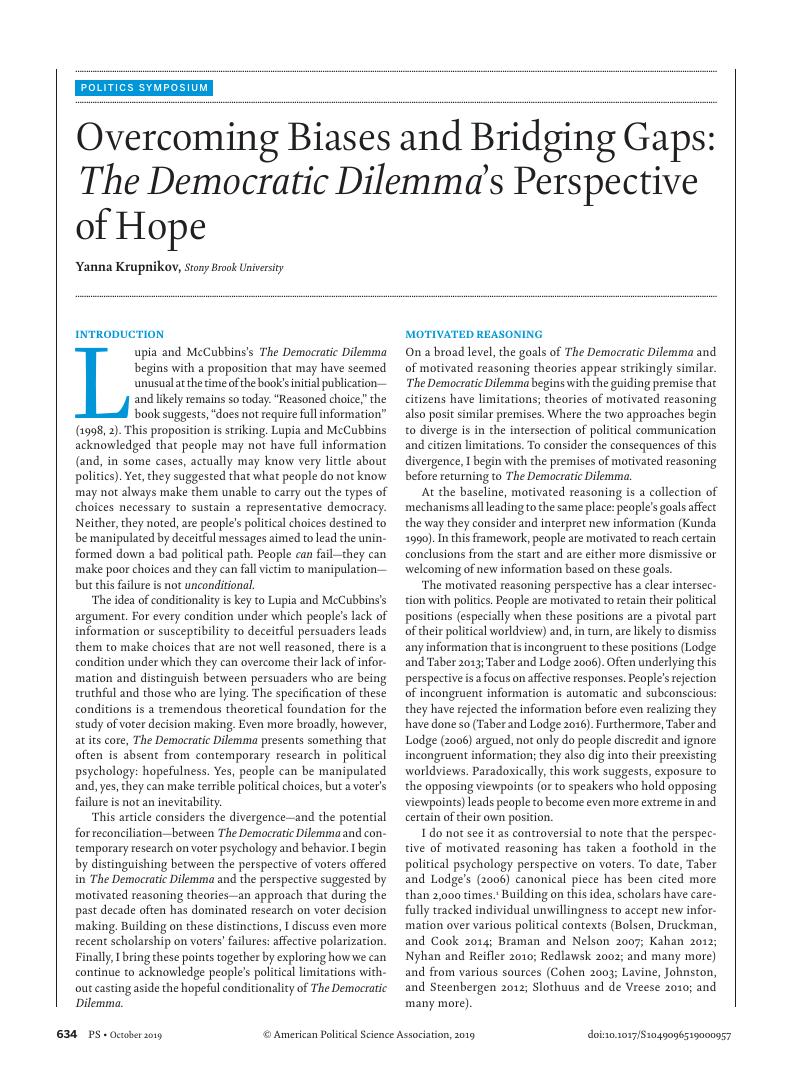No CrossRef data available.
Article contents
Overcoming Biases and Bridging Gaps: The Democratic Dilemma’s Perspective of Hope
Published online by Cambridge University Press: 08 July 2019
Abstract
An abstract is not available for this content so a preview has been provided. Please use the Get access link above for information on how to access this content.

- Type
- Symposium: Can Citizens Learn What They Need to Know? Reflections on The Democratic Dilemma
- Information
- Copyright
- Copyright © American Political Science Association 2019
References
REFERENCES
Abramowitz, Alan I., and Saunders, Kyle L.. 2008. “Is Polarization a Myth?” Journal of Politics 70 (2): 542–55.CrossRefGoogle Scholar
Ahn, T. K., Huckfeldt, Robert, and Ryan, John Barry. 2014. Experts, Activists and Interdependent Citizens: Are Electorates Self-Educating? New York: Cambridge University Press.CrossRefGoogle Scholar
Berinsky, Adam. 2017. “Rumors and Health Care Reform: Experiments in Political Misinformation.” British Journal of Political Science 47 (2): 241–62.CrossRefGoogle Scholar
Bolsen, Toby, Druckman, James N., and Cook, Fay Lomax. 2014. “The Influence of Partisan Motivated Reasoning on Public Opinion.” Political Behavior 36 (2): 235–62.CrossRefGoogle Scholar
Boudreau, Cheryl, and MacKenzie, Scott A.. 2014. “Informing the Electorate? How Party Cues and Policy Information Affect Public Opinion about Initiatives.” American Journal of Political Science 58 (1): 48–62.CrossRefGoogle Scholar
Braman, Eileen, and Nelson, Thomas E.. 2007. “Mechanisms of Motivated Reasoning? Analogical Perception in Discrimination Disputes.” American Journal of Political Science 51 (4): 940–56.CrossRefGoogle Scholar
Carlson, Taylor. 2019. “Through the Grapevine: Informational Consequences of Interpersonal Political Communication.” American Political Science Review 113 (2): 325–29.CrossRefGoogle Scholar
Cohen, Geoffrey L. 2003. “Party over Policy: The Dominating Impact of Group Influence on Political Beliefs.” Journal of Personality and Social Psychology 85 (5): 808–22.CrossRefGoogle ScholarPubMed
Connors, Elizabeth. 2019. “The Social Dimension of Political Values.” Political Behavior. Available at DOI: https://doi.org/10.1007/s11109-019-09530-3.CrossRefGoogle Scholar
Converse, Philip. 1964. “The Nature of Belief Systems in Mass Publics.” In Ideology and Discontents, ed. Apter, David, 1–74. New York: Free Press.Google Scholar
Druckman, James N. 2012. “The Politics of Motivation.” Critical Review 24 (2): 199–216.CrossRefGoogle Scholar
Guess, Andrew and Coppock, Alexander. 2018. “Does Counter-Attitudinal Information Cause Backlash? Results from Three Large Survey Experiments.” British Journal of Political Science. Available at DOI: https://doi.org/10.1017/S0007123418000327CrossRefGoogle Scholar
Iyengar, Shanto. 1987. “Television News and Citizens’ Explanations of National Affairs.” American Political Science Review 81: 815–32.CrossRefGoogle Scholar
Iyengar, Shanto, Lelkes, Yphtach, Levendusky, Matthew, Malhotra, Neil, and Westwood, Sean. 2019. “The Origins and Consequences of Affective Polarization in the United States.” Annual Review of Political Science 22: 129–146.CrossRefGoogle Scholar
Kahan, Daniel M. 2012. “Ideology, Motivated Reasoning, and Cognitive Reflection: An Experimental Study.” Judgment and Decision Making 8: 407–24.Google Scholar
Klar, Samara. 2014. “Partisanship in a Social Setting.” American Journal of Political Science 58 (3): 687–704.CrossRefGoogle Scholar
Klar, Samara, and Krupnikov, Yanna. 2016. Independent Politics: How American Disdain for Parties Leads to Political Inaction . New York: Cambridge University Press.CrossRefGoogle Scholar
Klar, Samara, Krupnikov, Yanna, and Ryan, John Barry. 2018. “Affective Polarization or Partisan Disdain? Untangling a Dislike for the Opposing Party from a Dislike of Partisanship.” Public Opinion Quarterly 82 (2): 379–90.CrossRefGoogle Scholar
Kunda, Ziva. 1990. “The Case for Motivated Reasoning.” Psychological Bulletin 108 (3): 480–98.CrossRefGoogle ScholarPubMed
Lavine, Howard, Johnston, Christopher, and Steenbergen, Marco. 2012. The Ambivalent Partisan: How Critical Loyalty Promotes Democracy. New York: Oxford University Press.CrossRefGoogle Scholar
Levendusky, Matthew, and Malhotra, Neil. 2016. “Does Media Coverage of Partisan Polarization Affect Political Attitudes?” Political Communication 33 (2): 283–301.CrossRefGoogle Scholar
Lodge, Milton, and Taber, Charles. 2013. The Rationalizing Voter. New York: Cambridge University Press.CrossRefGoogle Scholar
Lupia, Arthur, and McCubbins, Mathew D.. 1998. The Democratic Dilemma: Can Citizens Learn What They Need to Know? Cambridge: Cambridge University Press.Google Scholar
Miller, Joanne, Saunders, Kyle L., and Farhart, Christina E.. 2016. “Conspiracy Endorsement as Motivated Reasoning: The Moderating Roles of Political Knowledge and Trust.” American Journal of Political Science 60 (4): 824–44.CrossRefGoogle Scholar
Mullinix, Kevin. 2016. “Partisanship and Preference Formation: Competing Motivations, Elite Polarization, and Issue Importance.” Political Behavior 38 (2): 383–411.CrossRefGoogle Scholar
Nyhan, Brendan, and Reifler, Jason. 2010. “When Corrections Fail: The Persistence of Political Misperceptions.” Political Behavior 32 (2): 303–30.CrossRefGoogle Scholar
Pietryka, Matthew. 2016. “Accuracy Motivations, Predispositions, and Social Information in Political Discussion Networks.” Political Psychology 37 (3): 367–86.CrossRefGoogle Scholar
Redlawsk, David P. 2002. “Hot Cognition or Cool Consideration? Testing the Effects of Motivated Reasoning on Political Decision Making.” Journal of Politics 64 (4): 1021–44.CrossRefGoogle Scholar
Slothuus, Rune, and de Vreese, Claes. 2010. “Political Parties, Motivated Reasoning, and Issue Framing Effects.” Journal of Politics 72 (3): 630–45.CrossRefGoogle Scholar
Taber, Charles, and Lodge, Milton. 2006. “Motivated Skepticism in the Evaluation of Political Beliefs.” American Journal of Political Science 50 (3): 755–69.CrossRefGoogle Scholar
Taber, Charles, and Lodge, Milton. 2016. “The Illusion of Choice in Democratic Politics: The Unconscious Impact of Motivated Political Reasoning.” Advances in Political Psychology 37 (1): 61–85.CrossRefGoogle Scholar
Wood, Thomas, and Porter, Ethan. 2018. “The Elusive Backfire Effect: Mass Attitudes’ Steadfast Factual Adherence.” Political Behavior. Available at DOI: https://doi.org/10.1007/s11109-018-9443-y.Google Scholar


